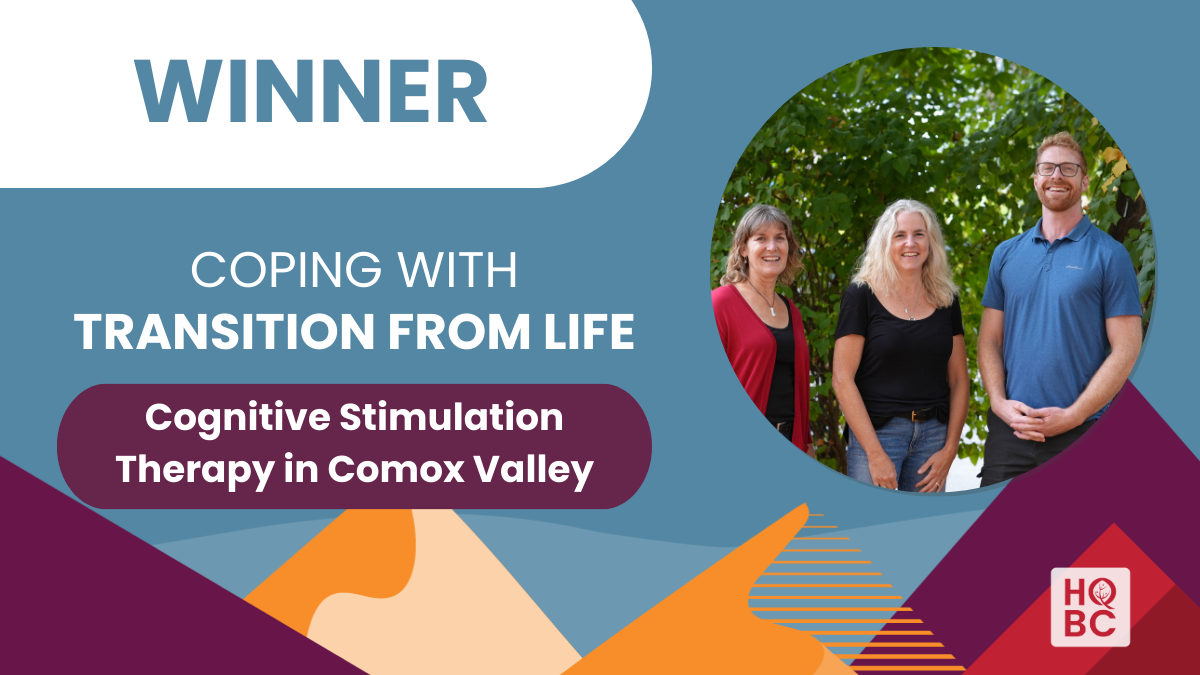- 2024
|
- Winner
|
- Coping with Transition from Life
What began as an initiative by two occupational therapists who had a passion for person-centred, evidence-based care has become a program that has improved quality of life for people living with mild-moderate dementia in Vancouver Island’s Comox Valley.
The Cognitive Stimulation Therapy (CST) initiative delivers evidence-based, non-pharmacologic interventions for mild-moderate dementia to patients and their informal caregivers in the Comox Valley. It includes activities that incorporate reminiscence therapy, multi-sensory stimulation and implicit learning using themes such as food, maps, sounds and childhood. For both program participants and caregivers, the program is helping to create connection and support so that no one feels they are facing a diagnosis of dementia, or the care of their loved one, on their own.
Alison Ritchie, who helped spearhead the program with fellow occupational therapist Laurel Steed, says as a clinician she finds the CST program meaningful and rewarding to facilitate.
“Observing clients finding hope through participating in the program, connecting and supporting each other and forging new friendships is a joy to watch unfold,” says Alison, who along with Laurel works on the Comox Valley Geriatric Specialty Services (GSS) Team. “Our aim is to maximize client engagement, using our professional expertise to tailor the activities to the right cognitive challenge in a respectful and fun way. Once clients feel safe and supported, they are often more talkative, confident and have a lot of wonderful stories and opinions to share!”
There is pressing need for expanded clinical treatment options for dementia; about one-third of Canadians over age 85 meet dementia criteria (CCMTA, 2017) and, by 2030, close to 1 million Canadians will be living with dementia. The Comox Valley’s population is older than the regional average, and the number of residents who are 75 and over is expected to double by 2040.
Robust research shows that CST can improve cognitive functioning, mental health, and quality of life for people with mild-moderate dementia, while providing respite and support for informal caregivers. No other treatment options are available for people with early dementia in the region; adult day programs and facility respite care are only appropriate for later stages of the disease.
In response to this gap in care and growing need in the community, Alison and Laurel sought out CST training so they could offer the program to their clients. Through a donation via the Comox Valley Healthcare Foundation in early 2022, they were able to pilot a CST program with two groups of participants in Comox.
The results were overwhelmingly positive. Data collected before and after participation showed that over the two months in the program, cognitive scores improved by 2% to 4%, and quality of life by 8.5% on average. Participants noted that this was the only support of its kind available to them, and 100% recommended it for others with early dementia.
Based on these results, the GSS team was awarded a $50,000 Spark Innovate Grant from the Centre for Aging + Brain Health Innovation and have expanded the program to offer more sessions in other communities, meet waitlist demand, and train new facilitators. It is poised to grow even further with active programs in two communities and 10 trained CST facilitators across the Island Health region.
Fellow occupational therapist Kyle Hillman joined Alison and Laurel as facilitators when the Comox CST pilot began. He says he’s seen clients benefit from engaging with their peers who were also experiencing dementia.
“This program really helped to fill a gap in therapeutic services for clients living with mild to moderate dementia in our community,” says Kyle. “I believe that CST has had a positive impact on our clients by enabling them to engage in activities that are graded to their ability, in a space that feels safe for them.”


